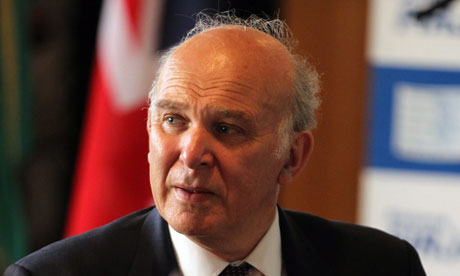In 1960, Harold Macmillan announced the abandonment of Britain's colonial aspirations with his famous "wind of change" speech. The empire had become too expensive, it was time to withdraw. Today, Vince Cable is poised to signal an equally historic retreat, this time from the empire of knowledge.
Britain has an unusually comprehensive capability across all the disciplines of scholarly research. Only the US can match our diversity of expertise. Everywhere else has concentrated on disciplines directly relevant to their commercial ecosystem. Germany is famously strong in engineering, Japan spectacularly weak in the social sciences.
Our expertise resides largely in our universities and has been irrigated for decades by increasing funding for research under both Conservative and Labour governments. The water of funding has allowed academics to spend time exploring the frontiers of knowledge, maintaining British outposts in many far-flung realms. Now the Treasury is considering cuts of 35% in research funding, turning off the tap to many fields. If that happens, expertise will rapidly wither, and our empire will fragment.
To understand the coming drought, consider just one of the government's two main channels of funding for academic researchers, the quality-related (QR) fund provided by the Higher Education Funding Council for England (Hefce). Hefce's QR budget is over £1.6bn a year. In recent years it has ringfenced the part of QR given to science and engineering disciplines. So when funding has been squeezed, it has been the social sciences and humanities that have borne all the cuts. If that policy is maintained in the face of cuts of 35%, there will be virtually no money left for the humanities or social sciences. Huge swathes of scholarship will lose half their irrigation. Many outposts will be abandoned. It will not be a case simply of trimming here and there.
Fear of such devastation is why learned societies, usually the most cordial of allies, have started attacking each other's turf. The Royal Academy of Engineering, for example, has recently advised ministers to make cuts in physics.
So as Vince Cable comes to make his first major speech on research on Wednesday, the stakes are high. It is of course inconceivable that the business secretary will say anything as frank as that he wants us to abandon much of our empire of knowledge. But then, Macmillan was also diplomatic in his language.
In his speech, the strongest Macmillan came up with was: "The wind of change is blowing through this continent, and whether we like it or not, this growth of national consciousness is a political fact. We must all accept it as a fact, and our national policies must take account of it."
On Wednesday, it is quite possible that the heart of Cable's speech will be something similar – perhaps: "The need to reduce the budget deficit is pressing, and whether we like it or not, the cuts required are a political fact. We must all accept it as a fact, and our policies on science and research must take account of it."
If so, then we will know the battles with the Treasury are over, deep cuts are coming, and that Britain has finally given up trying to maintain expertise across the entire empire of knowledge. The chill wind of history will have arrived. And the only question left will be which outposts to abandon first.
